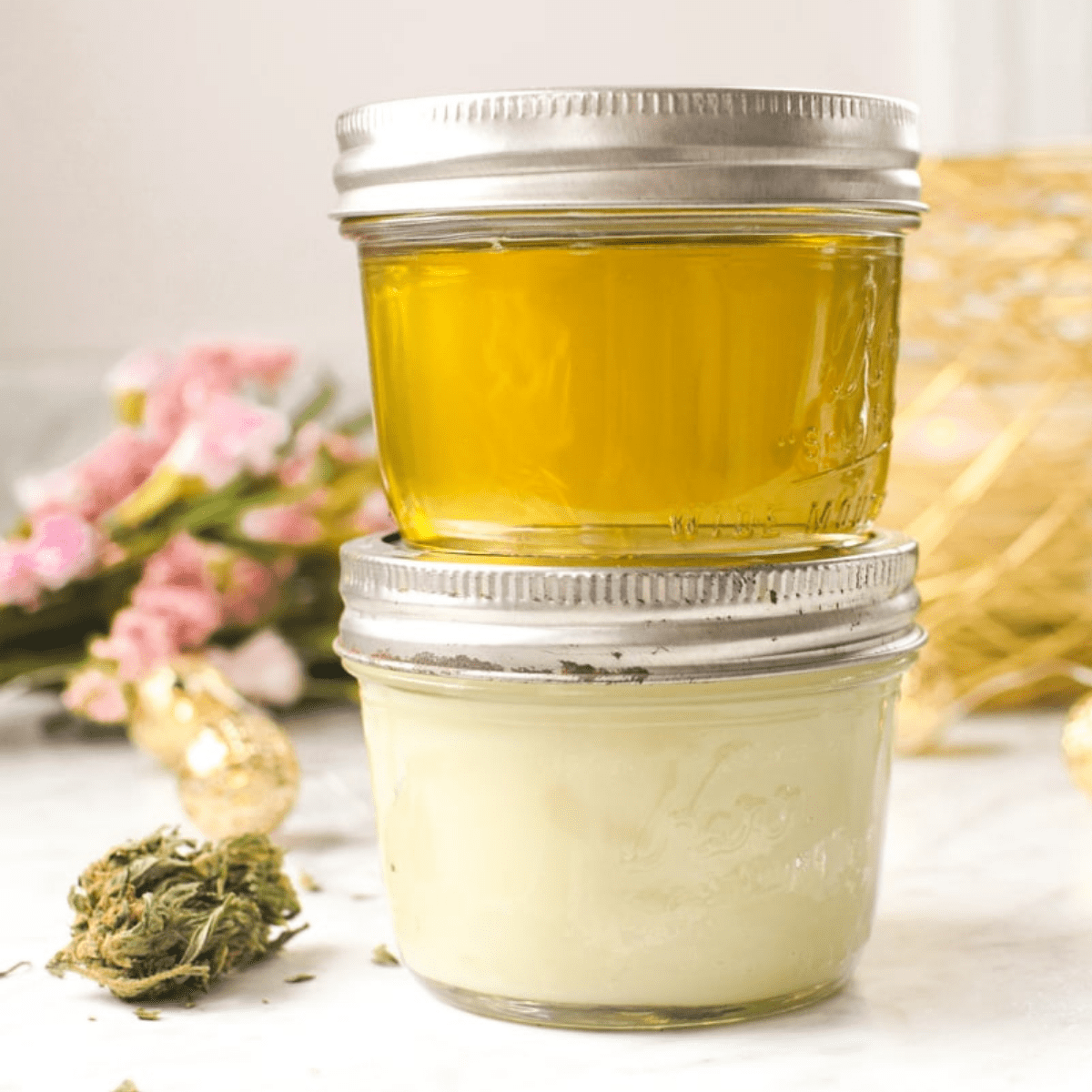Cannabis topicals like balms, salves, and lotions may help relieve pain and anxiety, have a quick onset time, and produce few intoxicating effects. Read on to discover eight ways cannabis topicals benefit the skin.
Why You Will Love This Guide
Cannabis topicals are any type of cannabis product applied directly to the skin.
Popular topical products on the marketplace today include cannabis oils, balms, ointments, bath salts, salves, lotions, perfumes, face creams, and personal arousal products.
Today, many Well With Cannabis Community members have already discovered the pain-relieving benefits and love their fast-acting response time.
Read on to learn more about the science-backed benefits of cannabis topicals, discover how you can make your own at home, and find where to purchase products to try.
How Topicals Benefit The Skin
Historically, ancient Chinese medicine has used cannabis topicals to treat skin ulcers, fungal infections, wounds, and more.
Applying cannabinoids to the skin has been found to provide localized pain relief along with important anti-inflammatory benefits.
When cannabinoids are applied directly to the skin, they interact with the CB2 cannabinoid receptors that are a part of our endocannabinoid system.
Delta-9 THC, delta-8 THC, THCA, and THCV exert anti-inflammatory effects when applied topically.
Anti-bacterial activity is found in CBD, CBG, and their acid forms CBDA and CBGA.
Cannabis topicals have been scientifically proven to help treat a variety of skin conditions including:
- Acne
- Contact dermatitis
- Atopic dermatitis
- Pruritus
- Psoriasis
- Skin cancer
Anecdotally they have been claimed to provide relief from:
- Arthritis
- Skin conditions like eczema
- Fungal infections
- Other skin ailments like cuts and scrapes
- Bug bites
A Non-Intoxicating Experience
One benefit of applying THC directly to the skin is that it does not produce the intoxicating effects seen with inhalation or edibles (unless used as a transdermal patch).
Cannabinoids, like CBD or THC, applied directly to the skin, penetrate the epidermis only and are not absorbed directly into the bloodstream.
Because THC applied topically does not enter the bloodstream, it can not produce an intoxicating effect.
Additionally, it has been suggested that topically applied THC will not show up in the bloodstream or urine when tested.
Depending on your desired experience, this no-high application method can be a great alternative, especially for new consumers.
Onset and Duration Times
Cannabis applied to the skin will have a typical onset time of effects anywhere from 15-30 minutes.
The average duration of effects can last anywhere from 2-4 hours.
Thankfully, topical cannabis is not absorbed into the bloodstream, so it can be reapplied as often as needed throughout the day.
An Option for Children
Because cannabinoids like THC are not directly absorbed into the bloodstream, topical applications may be a viable option for children.
The lack of intoxicating effects ensures no unwanted outcomes while still delivering important cannabis medicine as needed.
Of course, this should be discussed with your healthcare provider.
Potential Benefits of Topicals
Using cannabis directly on the skin may result in the following positive results:
- Pain relief
- Help for anxiety and depression
- Alleviate cancer-related symptoms
- Reduce symptoms associated with neurological disorders
- Reduce signs of skin aging
- Alleviate psoriasis
- Help with acne
- Moisturize the skin
We will review each one of these in-depth below.
Pain Relief
People have long reported that CBD provides immense pain relief, and scientific studies are beginning to support the theory.
As stated by Harvard Health, “CBD may offer an option for treating different types of chronic pain”3.
They also mention several studies that show the beneficial use of CBD oil for arthritis pain.
Additional studies show CBD may help reduce chronic pain and inflammation when applied topically and ingested.
Reduce Anxiety and Depression
Cannabis oil applied topically or otherwise, is often used to manage the symptoms of anxiety and depression.
The cannabinoid CBD, cannabidiol, has the most evidence to support its antidepressant and anti-anxiety properties.
There is not yet enough clinical evidence to support the use of topical cannabis to treat anxiety or depression, but that doesn’t mean many people don’t use cannabis for this exact reason.
Alleviate Cancer-Related Symptoms
Cancer-related side effects, including nausea, pain, and vomiting, can be treated with cannabis.
Cannabis oil may also help alleviate cancer-related pain.
Managing cancer-related symptoms is one of the main qualifying conditions for receiving a medical marijuana card.
One study found that cannabis oral sprays containing both CBD and THC are “generally well tolerated, with no evidence of a loss of effect for relieving cancer-related pain with long-term use”.
Neurological Disorders
Oral sprays containing CBD, like the prescription medication Sativex, have been used to reduce muscle spasticity and reduce epilepsy seizures in children.
They may also prevent neurological degeneration in people with Alzheimer’s, as CBD is a powerful neuroprotectant.
Many caretakers who care for loved ones with advanced neurological disorders like Alzheimer’s or dementia use cannabis topicals to bring pain relief and a sense of calm to their loved ones without introducing any potential intoxicating effects.
Reduce Signs of Aging Skin
It is believed that hemp seed oil may play a key role in ensuring your skin stays healthy, hydrated, and good-looking.
While hemp seed oil does not contain cannabinoids.
However, producers claim that using hemp seed oil-infused products may still reduce the visible signs of aging due to its anti-inflammatory and antioxidant properties.
Alleviate Psoriasis
Psoriasis is a chronic illness that causes the appearance of patches of abnormal skin, forming of scales, and red spots.
While more scientific research is needed, preliminary evidence suggests that cannabis may be a novel treatment for psoriasis.
Both hemp seed oil and CBD oil contain anti-inflammatory features, which may be attributed to the soothing effect often seen by those living with psoriasis.
A Solution for Acne
Could hemp seed oil or CBD oil be the next big trend in acne solutions?
It is believed that cannabis oil has the ability to inhibit oil production, a major underlying factor in the cause of acne.
Additionally, it is known that hemp seed and CBD oil have anti-inflammatory properties.
These properties may help to reduce the unwanted effects often seen on acne-prone skin.
Moisturize The Skin
When applied topically, CBD oil helps to hydrate and moisturize the skin.
Cannabis-infused oil has the perfect balance of nutrients to help prevent or stop the peeling of the skin, rough patches, and cracks.
Shop For Topicals
You will get the most benefits from a full-spectrum topical product because all of the cannabinoids work together synergistically to provide the body with what it needs.
Full-spectrum means that a wide range of cannabinoids are included, including THC.
All of my cannabis topical products are full-spectrum and come with rave customer reviews! Check them out for yourself:
- Full-spectrum CBD Face Cream
- Full-spectrum CBD Salve
- Full-spectrum CBD Recovery Stick
- Or use my to make your own!
Make Cannabis Topicals At Home
There are many benefits of making your own cannabis topicals at home including cost savings and control over your ingredients and final products.

Conclusion
Cannabis topicals have tremendous potential health benefits.
They are currently being used to help people manage pain, inflammation, anxiety, skin conditions, and more.
One of the major draws to cannabis topicals is that they do not produce any intoxicating effects when applied, even THC.
This no-high is perfect for new cannabis users or people who do not want to get high.
If you are looking for more in-depth information on cannabis topicals and how to use them to improve your specific conditions, I invite you to learn more in my Edibles Made Easy Online Course.
Source: Emily Kyle – emilykylenutrition.com
Image: unsplash.com

